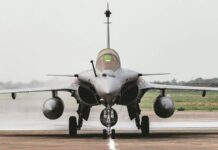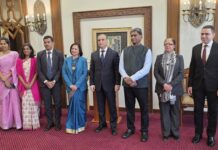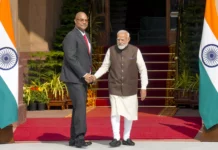 NEW DELHI: Declaring that “war is not an option”, India today said it had decided to hold dialogue with Pakistan as it is the only way to remove “the shadow of terrorism”.
NEW DELHI: Declaring that “war is not an option”, India today said it had decided to hold dialogue with Pakistan as it is the only way to remove “the shadow of terrorism”.
External Affairs Minister Sushma Swaraj said in Lok Sabha that India and Pakistan decided to hold talks on terror when the Prime Ministers Narendra Modi and Nawaz Sharif met in Ufa (Russia) in July and then in Paris recently.
“We said we can talk so that terrorism comes to an end.
So talks (between NSAs) took place in Bangkok where we discussed about terrorism. But one meeting will not bring a solution to all the problems. So we will continue the dialogue,” she said during Question Hour.
When BJP member Ganesh Singh asked whether India was exploring options like the US did to hunt down terrorists like Osama Bin Laden, Swaraj said India is talking to Pakistan on the terrorist camps existing in Pakistan-occupied Kashmir (PoK) as “war is not an option”.
“We have decided that through talks we will resolve the issue of terrorism as talks is the way forward so that the shadow of terror is removed. But we want to make it clear, our Prime Minister has made it clear that talks and terror can’t go together. Dialogue is drowned by the sound of explosion,” she said.
Swaraj was speaking against the backdrop of recent decision to re-start the ‘Comprehensive’ dialogue with Pakistan under which various subjects, including terrorism and Jammu and Kashmir, will be discussed.
The External Affairs Minister said Modi had said there was a need for talks to resolve the issue of terrorism.
“The Prime Minister said let’s talk on terror. For talks we will have to put in faith. There is no third party. Through talks, both the countries are trying to resolve the issue of terrorism,” she said.
Swaraj said following Modi’s conversation with Sharif in Paris on November 30 on the sidelines of climate change summit and in line with the Ufa understanding between the two leaders, the National Security Advisors of the two countries met in Bangkok on December 6.
“They held candid and constructive discussions. During my recent visit to Pakistan on December 8-9, the two sides decided that the NSAs will continue to address all issues connected to terrorism. The Indian side was assured of the steps being taken to expedite the early conclusion of the Mumbai trial,” she said. (More) PTI ACB AKK
The External Affairs Minister said India will continue to take all necessary steps to safeguard the nation’s security and safety of all citizens.
When asked whether India raised the issue of cross-border terrorism at the international fora like the UN, Swaraj said government actively discusses it in all its forms and manifestations in multilateral fora including UN, EU, SCO, ARF, BIMSTEC, SAARC, GCTF etc. and bilaterally with several countries, including all P-5 countries in Joint Working Groups on counter terrorism.
She said the Prime Minister had raised the issue of the Comprehensive Convention on International Terrorism (CCIT) which has been pending in the United Nations for adoption since 1996.
The Prime Minister has also discussed about the CCIT with several world leaders. “It is heartening that now we are getting support from many countries and we are hopeful that the CCIT resolution would be adopted in the UN soon,” she said.
CCIT, a global treaty proposed by India in 1996, aims to ban terrorists and make it binding for countries to deny funds and safe haven to them.
Swaraj said India has taken up on a number of occasions bilaterally with Pakistan and also where required with international community New Delhi’s concerns regarding cross-border terrorism.
“As a result of the government’s consistent pursuit of the matter, several individuals including Hafiz Saeed and entities including Lashkar-e-Taiba and Jamaat-ud-Dawaa have been listed under the relevant provisions of the UNSC resolution No. 1267 which deals with Al Qaeda and related organizations,” she said.
She said Pakistan had arrested the suspects for perpetrating the Mumbai terrorist attack of 2008 and a trial is underway in Pakistan in this regard. -PTI






